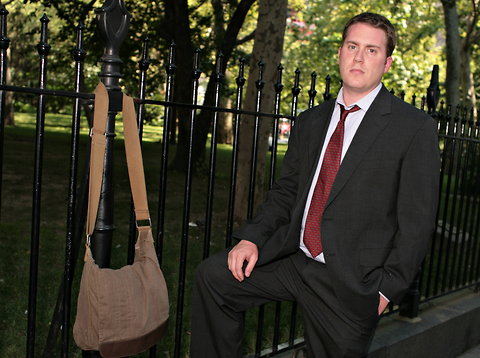So it seems on Madison Avenue as advertisers and agencies prepare for the annual television upfront week, to take place in New York next week from Monday through Thursday. The largest broadcast networks and cable channels — English-language and Spanish-language, from ABC to Univision — will show their programming for the 2013-14 season in 18 or so slick, expensive presentations in places like the New Amsterdam Theater, Carnegie Hall and Radio City Music Hall.
The upfront week arrives after 12 weeks of presentations by other cable channels and digital media companies, so plentiful at times that agencies and advertisers could attend three in a single day.
The Great Upfront Frenzy of 2013 — possibly the best thing to happen to the cater-waiter industry since the invention of the reversible cummerbund — began in early February and did not end until Thursday morning, when executives at the Ovation cable channel told reporters about their channel’s coming season.
“We knew this was the last week before the upfront week,” said Liz Janneman, executive vice president for advertising sales at Ovation. “We wanted to try to get some attention, and make some noise, by not being in the middle of all that.”
Ovation is adopting a new logo along with a new brand identity, “Art everywhere,” which replaces “Be moved.” The executives also described their intent to increase the amount of original programming on Ovation to 236 hours this year from 46 in 2012.
“We are doubling, tripling, quadrupling down on” additional content for viewers, said Robert Weiss, chief creative officer at Ovation, who discussed 25 new series that are being added to the lineup for 2013-14 or are on a path of “fast-track development.”
That has been perhaps the most notable trend of the preupfront upfront weeks: cable channels bolstering original offerings.
Among others saying that is the strategy are AE, ABC Family, AMC, BBC America, Bravo, FX, the Hallmark Channel, History, Lifetime, Oxygen, TBS, TNT and USA.
In addition to ABC and Univision, those scheduled to make upfront week appearances include Adult Swim, CBS, CW, Discovery U.S. Hispanic, ESPN, ESPN Deportes, Fox, Fox Hispanic Media, NBC, NuvoTV, TBS, Telemundo, TNT, Tr3s and USA.
Some are not waiting until next week to make like TV Guide and provide programming information. Fox, part of News Corporation, announced on Wednesday that it would add nine series — four dramas and five comedies — to its schedule, including shows like “Almost Human,” with Michael Ealy and Karl Urban; “Rake,” with Greg Kinnear; and “Us Them,” with Alexis Bledel and Jason Ritter.
NBC, part of the NBCUniversal division of Comcast, followed on Thursday with word of five new shows — three sitcoms and two dramas — among them “Sean Saves the World,” with Sean Hayes, and “Crisis,” with Gillian Anderson.
After the upfront week ends, networks and channels begin negotiating with advertisers and agencies over the sale of commercial time ahead of the fall. (That explains the term “upfront,” in that the dickering occurs before the new season.) Last year, in the upfront market before the start of the 2012-13 season, marketers agreed to buy an estimated $20 billion worth of commercial time.
There has been speculation that if the television industry seeks to raise ad rates for 2013-14 considerably higher than they have been for 2012-13, Madison Avenue may balk, citing recent erosion in viewership and ratings as well as a current schedule bereft of hit new series.
In a report, Brian Wieser, an analyst at the Pivotal Research Group, said he believed that any percentage increases won by the leading broadcast networks would end up in a range of 5 to 7 percent, with percentage gains for the leading cable channels “in or slightly below this range.”
Another challenge for channels and networks is a concerted effort by online video publishers to encourage agencies and advertisers to buy commercial time on Web sites to supplement or complement the TV spots they buy. There were 17 presentations with that goal during an event last week in New York called the Digital Content NewFronts, with participants that included AOL, Google, Hulu and Yahoo.
Senior executives of leading Madison Avenue media agencies like Carat, Digitas, OMD and Universal McCann, sent an open letter on Wednesday described as a “call to arms” to the publishers that presented at the NewFronts. The executives said they were eager to “put equitable skin in the game” but sought assurances that the publishers would agree to major commitments like giving online video programs “the promotion they need and deserve” and providing effective ways to measure results.
Randall Rothenberg, president and chief executive of the Interactive Advertising Bureau, which sponsored the NewFronts, replied on Thursday. He pledged in a letter of his own “to collaborate with you” and asked in turn that the media agencies agree to steps like helping to develop “seamless” viewing across all screens and to “limit the use of advertising to support the piracy of intellectual property.”
Mr. Rothenberg also invited the media agencies to meet with his association to talk about joining forces to start a “Digital Video Center of Excellence,” which would encourage demand for original online video programming. “We’ll gladly buy the pizza and beer,” he wrote.
On that note, for those who may be sad at the prospect of Upfront Nation disbanding after Thursday, TBS, part of the Turner Broadcasting System unit of Time Warner, sent invitations to an event next Friday billed as an “upfront hangover brunch.”
Article source: http://www.nytimes.com/2013/05/10/business/media/now-the-tv-heavyweights-have-their-week-to-unveil-shows.html?partner=rss&emc=rss
